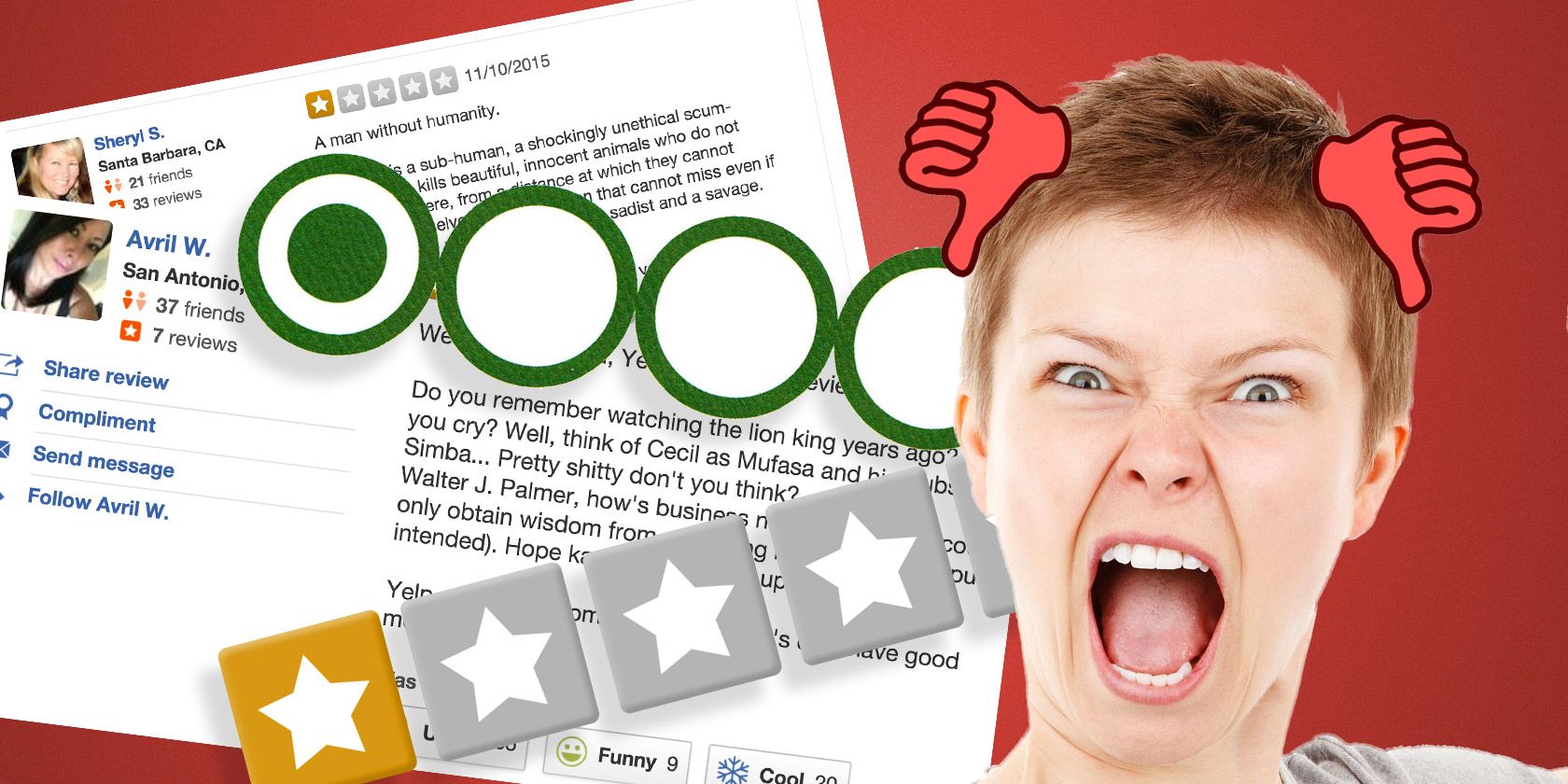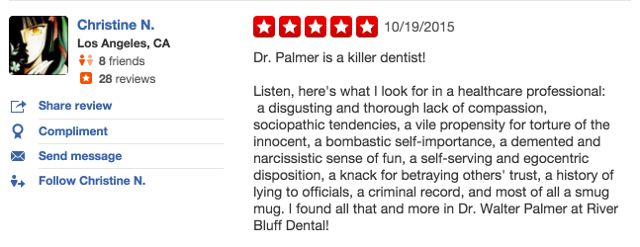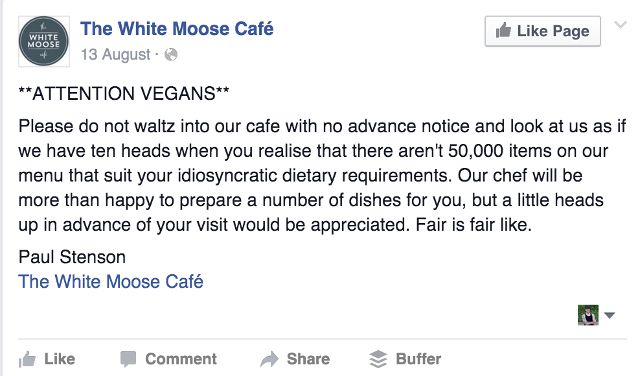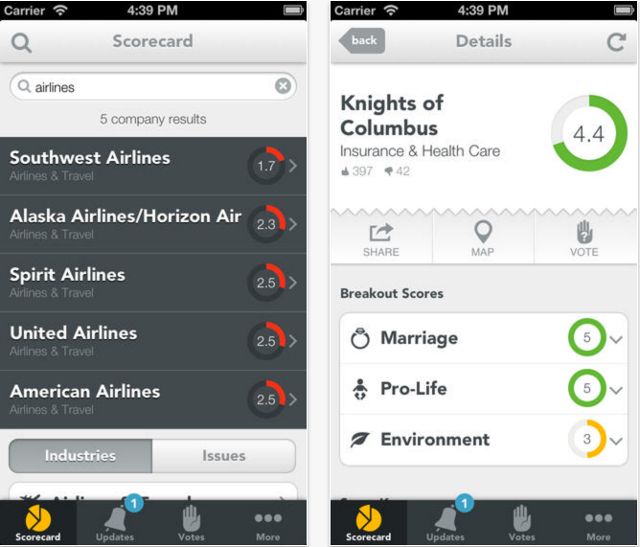"You kill a protected lion, we kill your shitty business :)" "Millions will ALWAYS HATE YOU, Walter!" "you should suffer by an arrow! Then die by a bullet to the head!"
These are only three of the dozens of similar comments left on the Yelp page of a Bloomington, Minnesota dentist's office. Online reviews are often a contentious affair, but what could cause such hatred toward a dentist? What could cause an outpouring of death threats, delivered both on the site and at the office? And what can we learn from it?
The World vs. Walter Palmer
Walter Palmer, a dentist at River Bluff Dental, was an amateur big-game hunter. Before this summer, he'd recorded kills of buffalo, mountain lion, moose, and polar bear. He was a member of the Safari Club, a group dedicated to "protecting the freedom to hunt [and] promoting wildlife conservation worldwide." No one had ever heard of him.
But Palmer made news after he and a hunting guide lured a very valuable lion out of a national park in Zimbabwe before killing it with the intention of bringing the head back to the United States and mounting it (presumably among other trophies in his possession). This lion was named Cecil, and he brought a significant amount of tourist dollars into Zimbabwe every year. When the news got out, the Internet exploded.
Palmer's business, River Bluff Dental, was hit with a seemingly infinite stream of hateful posts on multiple platforms with phrases like "despicable human being," "I hope you die soon you piece of shit," "Don't go to this dentist, unless you want your head cut off," "Anyone that sells him a box, lists' [sic] his house for sale or delivers a pizza, will have Cecil's blood on their hands- Don't become an accomplice. Help him and we come after you." and this rather histrionic paragraph, which is only the first of three in the review:
And that's just on the first page. The death and torture threats to Palmer and anyone connected to him continue to this day. Palmer's home address and phone number were posted, and his vacation home in Florida was vandalized. Placards with more death threats and "#catlivesmatter" hashtags on them, as well as stuffed animals, were repeatedly left at River Bluff Dental before the business was forced to hire a security guard.
Yelp tried — and continues to try — in vain to remove these comments as they're put up, but some of these people are so committed to the cause that they just keep putting their reviews back up. (Obviously many people have left the cause, as there are only 32 reviews at the time of this writing.)
Not the First Time, Won't Be The Last
Palmer may have made the biggest splash in the news, but he's far from the first to receive a lashing via Yelp and other review sites. After Indiana's Religious Freedom Restoration Act was passed, Memories Pizza was the first business to publicly state that it would act under the law and would not cater same-sex weddings due to the owners' religious beliefs. They got slammed with bad reviews, and were forced to close temporarily due to fake orders and threats.
The White Moose Café also received a range of bad reviews after this Facebook post:
After a number of other posts from both sides, the White Moose received over 2,000 one-star reviews in 24 hours, primarily from people who had never been to the café (Stenson subsequently wrote a post thanking the negative reviewers for a huge amount of free publicity).
And of course, you probably remember the Union Street Guest House, which told its guests that they would receive a $500 fine for leaving a bad review—refundable after changing it to a positive one. The backlash was entirely predictable.
There are plenty more examples of companies and individuals getting slammed with bad reviews that have nothing to do with the service or product that they provide. In essence, they're about politics. Not in the left-wing, right-wing send of the word, but in the social sense: about whether or not you agree with something that the company has done or said. These negative reviews are out to make a point not about service but about culture.
When I say "politics" here, I don't necessarily mean left- or right-wing views. I'm talking about any views or beliefs that people hold — they could be governmental, economic, environmental, religious, moral, or related to just about anything else. For example, I would support a business that was big on supporting mental health causes, regardless of their liberal or conservative values. That's a political choice in the context of this discussion. (Please remember this before taking to the comments to rage about liberals or conservatives.)
Why Does This Happen?
This is obviously not why reviews sites were created. Yelp and TripAdvisor have put forth a lot of effort to get rid of reviews that aren't based on actual experience with a provider, and have repeatedly stated that they won't stand for the continuance of this practice. They also lead a fight against reviews being manipulated by the companies themselves, which is an entirely different, albeit related, issue.
In analyzing why this behavior arises, there seem to be two explanations, both of which go hand-in-hand. The first, and more respectable, objective is to provide reviews that enlighten people to the beliefs, motivations, and behaviors of business owners. Many people take this into account when choosing businesses to frequent. Of course, there are plenty of people out there who couldn't care less if their neighborhood gas station owner is an avid hunter, or if the handyman down the street is a Republican – but some people do, in fact, value that information.
For example, there's a conservatively-minded app called 2nd Vote that indicates whether your money might be supporting liberal or conservative causes when you shop at certain places, so users can decide if they want to support a company based on its reported politics. Buycott is a similar app — though generally more liberal — that tells you if specific products are linked with campaigns that you might disagree with. Avoiding companies, organizations, and anything else you deal with in your daily life because you disagree with what they stand for — or what their owners or employers stand for — is totally fine, and some of these reviews do seem to have this idea in mind.
However, there's a more subtle, more sinister goal that could be read into these reviews as well: "Because you don't agree with me, I'm going to destroy you." It sounds drastic, but all you have to do is look at the River Bluff Dental reviews to see it plain in front of your face. These reviews are driven by anger and hate, and they're not meant to engender enlightening conversation. In fact, many of them don't seem like they're meant to be read by the general public at all, and that's quite important.
Why? Because those one-star reviews could dissuade someone from even looking into the White Moose or Memories Pizza when they're scrolling through TripAdvisor, despite how they may or may not feel about the politics of the establishment. If someone doesn't support gay marriage — and they're entitled to that view, at least here in the US — they may want to go to Memories Pizza to support the stance they've taken. Or maybe it's just a pizza parlor that's close and convenient. But when they're looking at pizza options, and they see a one- or two-star average, they're likely to think "this pizza sucks," not "maybe they've said something controversial and are being punished for it," and pass right over it. That's very damaging to a business in a way that's not necessarily fair.
The disgusting vitriol and venom that shows up on these review pages certainly gives a strong indication that many of the people leaving reviews like this aren't doing so to start a conversation or to enlighten potential customers. In many cases, they've never been to that place of business, and they likely know very little about it (see the paragraph above from "Christine N." on Dr. Palmer for a great example). They're doing it in an attempt to destroy someone's life because they did something that reviewer doesn't agree with.
And that's not an acceptable way to behave, even in the nasty world of online reviews.
Moving Forward
The Internet is known as a place of free speech, and that's certainly something to be protected. But online reviews have created an entirely new and problematic vector of personal attacks, and it's only likely to get worse until something changes. Whether that's a more widespread agreement to act like adults and treat each other like human beings, stronger enforcement of rules stipulating that reviews must be helpful and based on experience, or an abolishment of the world of reviews as we currently know it, I don't know. But unless there's some sort of change, reviews will continue to be used for personal and political attacks.
Of course, not every review is bad. They're not all motivated by political reasons, and not all of them are fake — there are indeed some really useful reviews out there (and, of course, some really hilarious ones that aren't useful, but provide great entertainment).
But it only takes a few bad ones to poison the well. And that's exactly what some of these malevolent reviewers are doing: their attempts to destroy people because they don't agree with a set of political beliefs casts a pall over the entire world of online reviews. And is that really what we want to be happening? Do we want to be complicit with the destruction of this fantastically useful tool? Online reviews are complicated and misleading enough as it is. We need to start thinking twice about how we interact with people and organizations online.
And now, we want to hear from you. Do you leave reviews that are motivated by political views or beliefs? Do you take these sorts of reviews into account? Do you think they should be shared on open review sites, or should they be limited to specific sites with specific issues in mind? Let's have an enlightened conversation about this. Share your thoughts below!
Image credits: PromesaArtStudio via Shutterstock.com, Ollyy via Shutterstock.







